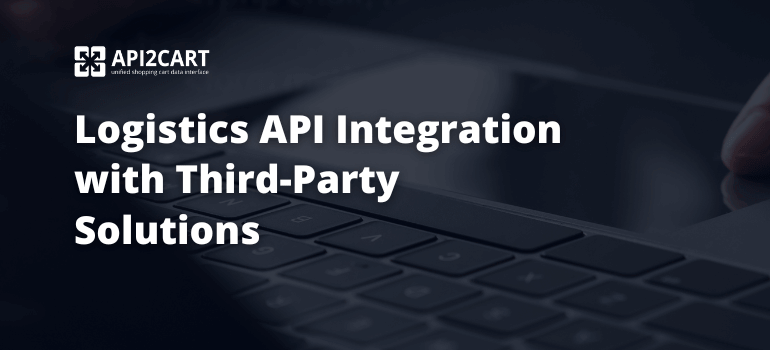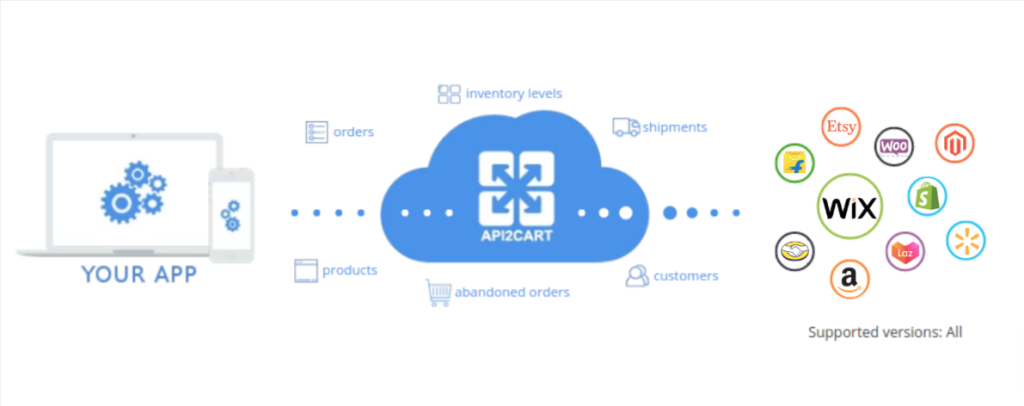
Introduction
Logistics software providers should focus not only on providing strong features but also on creating integrations with external systems. Third-party solutions' logistics API integration plays a significant role here.
The article explores the world of logistics software API integration. We will discuss what it has to offer and the steps for successful integration with eCommerce platforms. In the end, you will receive the knowledge of how API integration can make your logistics software a central engine that drives a fully connected supply chain ecosystem.
Definition of Logistics API Integration with Third-Party Solutions
In the complicated world of logistics, data is highly important. The availability of smooth information exchange between systems is a key factor for a smooth operation. This is where logistics software API integration comes in. It creates a communication channel between your logistics software and external applications using an API (Application Programming Interface).
Consider an API as a digital translator. It enables your software to communicate with other systems using a standard set of instructions and rules. This makes it possible to share the critical information like shipment details, inventory levels and tracking information leading to a more connected and automated logistics environment. Through integrating with other solutions, your software can create a variety of new functionalities and help businesses to manage their supply chains more effectively.
Importance of Real-Time Updates in the Logistics Industry
Real-time data updates are of utmost importance in logistics software solutions because the industry is complex and time-critical. In logistics, every second counts, and timely information is key to good decision-making and smooth operations. Real-time updates help logistics companies track the shipments, monitor the levels of the goods in inventory as well as ensuring that goods are delivered on time and in the right places.
To access and manage all the needed data correctly, logistic software solutions must have integration with multiple third-party systems like, for example, eCommerce platforms.
Why Do Logistics Companies Need API Integration with eCommerce Platforms?
API integration with eCommerce platforms is a major factor which logistics companies use while they want to increase their performance and efficiency, and meet the rising online retail demands. Logistics companies could be connected with eCommerce platforms by using APIs (Application Programming Interfaces) to automate several processes such as order fulfillment, tracking shipment and inventory management. This integration allows for the data exchange between the eCommerce platform and the logistics systems to occur at a fast pace and without errors which cuts out manual data entry and the risk of data entry errors. The use of the integration of API can give the logistics companies a faster process of orders, real-time management of inventory levels, and accurate shipment tracking information delivery to the customers, which are the key reasons that will improve the service quality and customer satisfaction.
Furthermore, the API integration with eCommerce platforms allows logistics companies to extend their markets and generate profit from the growing eCommerce market. The rise in the number of people who are shopping online is pushing the logistic companies to be able to keep up with the market by integrating with the famous eCommerce platforms such as Shopify, Magento, and WooCommerce. This is particularly important for logistics companies that want to get eCommerce merchants who are looking for trusted shipping and fulfillment services.
In addition, this integration allows logistics companies to tap into valuable data insights from eCommerce platforms like order volume fluctuations and customer demographics that can improve strategic decision-making and help make operations more efficient and profitable.
How to Develop The Integration Easily?
The API2Cart service can greatly simplify the integration with eCommerce platforms because it provides a unified API interface. API2Cart use an API that works as a unified interface to be able to connect your system to various eCommerce platforms like Shopify, Magento, WooCommerce and more. Such a situation, in turn, allows developers to concentrate on the application itself and eliminate the need for individual integrations for each platform, thus saving time and the resources that could be used for product development. Developers can greatly ease the integration using API2Cart API methods and detailed documentation.

In addition, API2Cart provides tools for developers and technical support to ensure the smooth integration. With detailed documentation, code samples and technical support, the developers have all they need to achieve a successful integration of their logistics software with eCommerce platforms using API2Cart.
Conclusion
By developing API integration with third-party solutions, especially eCommerce platforms, logistics software vendors can allow businesses to reach a new level of efficiency and customer satisfaction.
Sharing data in real time, automating workflows, and getting useful insights enables to maximize operations, reduce costs, and increase customer satisfaction. Do not let this opportunity slip away. Think about the API integration now and get the most out of your logistics software in a world of connected supply chains of the future.



